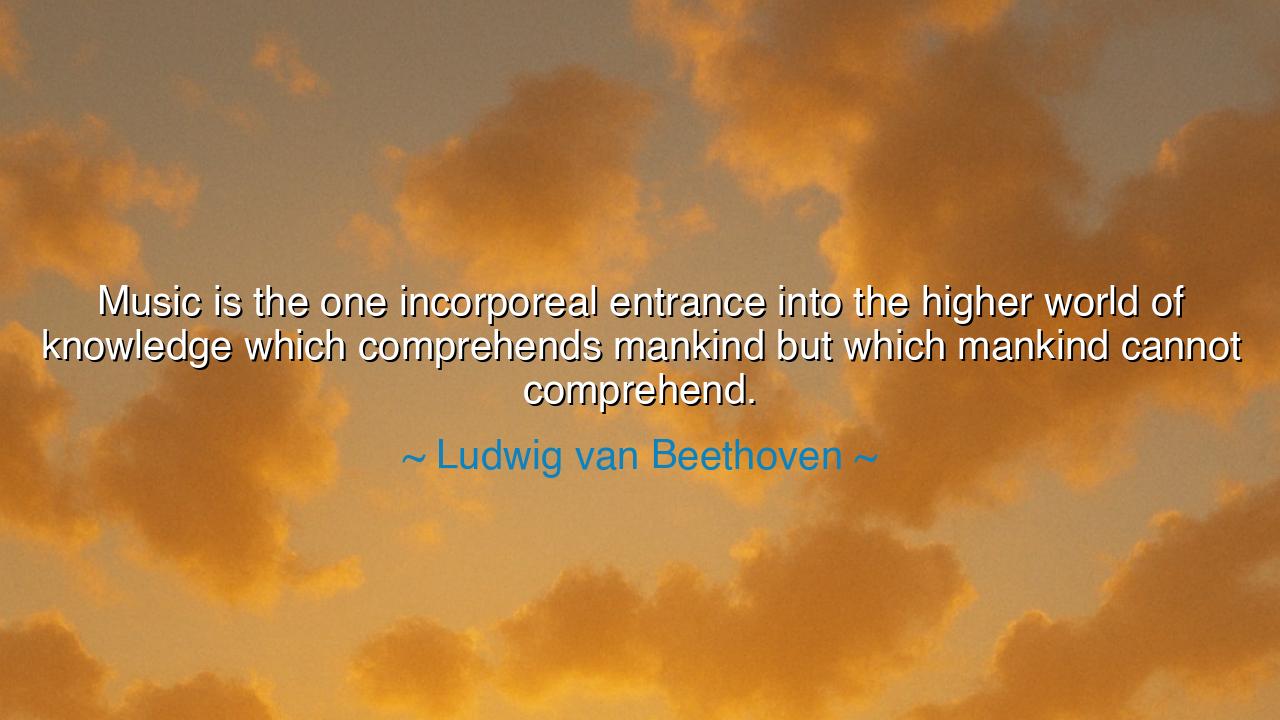
Music is the one incorporeal entrance into the higher world of
Music is the one incorporeal entrance into the higher world of knowledge which comprehends mankind but which mankind cannot comprehend.






“Music is the one incorporeal entrance into the higher world of knowledge which comprehends mankind but which mankind cannot comprehend.” — Ludwig van Beethoven
There are words that do not merely speak — they sing. These words from Ludwig van Beethoven, the titan of sound and spirit, are among them. In them, he unveils a mystery: that music is not merely an art, but a doorway — an incorporeal passage leading from the visible world to the invisible, from human emotion to divine understanding. When Beethoven calls music “the one incorporeal entrance,” he reminds us that though melodies have no body, they touch the soul more deeply than any tangible form ever could. They belong to a realm beyond words — a higher world of knowledge, a place that knows us, even when we do not know ourselves.
Beethoven spoke these words as one who had suffered much — a man who had lost the gift most precious to a composer: his hearing. Yet in his silence, he heard more than others could ever imagine. As the world around him grew mute, the universe within him began to sing. It was then that he discovered what few mortals ever do — that music is not of the senses, but of the spirit. Through it, he communed with something vast and eternal, something that “comprehends mankind but which mankind cannot comprehend.” His music became a bridge between flesh and infinity, between sorrow and salvation.
In this, Beethoven stands as a prophet of the unseen harmony that threads through existence. Just as the ancients believed that the cosmos itself was built upon a “music of the spheres,” he too sensed that every human heart is an instrument in that grand orchestra of creation. The stars move in rhythm, the oceans breathe in time, and even the silence between sounds holds meaning. Music, he knew, is the soul’s language — the only one that unites all hearts, transcending tribe, creed, and time. It is a knowledge beyond thought, one that speaks directly to the essence of being.
Consider the moment in 1824, when Beethoven, old and deaf, stood before the audience at the premiere of his Ninth Symphony. He could not hear the roar of applause that followed, nor the thunder of his own creation. A singer gently turned him toward the crowd so he might see their rapture. In that moment, it was clear that though he could no longer hear music, he was music. He had become a vessel through which the divine spoke to humanity. His Ode to Joy was not merely a song — it was a revelation, a cry of unity between heaven and earth.
Beethoven’s insight reveals that true knowledge does not always come from reason or books, but from communion with the eternal — that higher realm which moves through us as inspiration, emotion, and love. When he says that mankind “cannot comprehend” this world, he means that we cannot grasp it with the mind alone; we must feel it, surrender to it, and be transformed by it. Music does not teach us facts — it teaches us truths that cannot be spoken, only experienced. It shows us that the highest wisdom is not to understand, but to be moved.
Throughout history, the power of music has shaped both hearts and nations. When slaves sang songs of sorrow and hope, their melodies carried truths no sermon could express. When soldiers marched into battle, it was music that gave them courage. And when humanity has stood on the brink of despair — after wars, after loss, after silence — it has always been music that led the way back to light. The ancients played their lyres to honor the gods; Beethoven played his piano to speak to eternity.
Thus, the lesson of his words is clear: cherish music not merely as entertainment, but as revelation. Listen not only with your ears, but with your soul. In every melody, there is wisdom; in every harmony, there is unity; in every silence, there is the breath of the infinite. Let it teach you humility before the mysteries of life — for the divine does not always speak in thunder or scripture, but in song.
So, when you next hear a piece of music that moves you, do not ask, “What does it mean?” Instead, allow yourself to be carried through that incorporeal entrance into the higher world of knowledge — the world that knows you, feels you, and holds you in its invisible embrace. For in that sacred moment, as Beethoven knew, you are no longer merely human — you are part of eternity’s great symphony.






AAdministratorAdministrator
Welcome, honored guests. Please leave a comment, we will respond soon